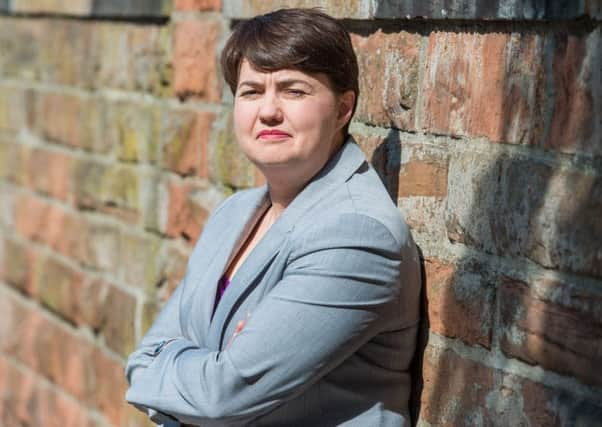Tories '˜should cut tax' with devolved powers


Tomorrow sees the publication of an independent report commissioned by the Scottish Tories to examine how the Scottish Parliament should use the new tax powers coming to it.
Scotland on Sunday has learned that the Commission for Competitive and Fair Taxation in Scotland will advise the Conservatives that Scotland’s tax burden should be lower than the rest of the UK “when affordable”.
Advertisement
Hide AdAdvertisement
Hide AdFormally embracing such a regime would confirm the Conservatives’ position as the only tax-cutting major party in Scottish politics.
Davidson hopes that her party can make inroads into Nicola Sturgeon’s domination of Holyrood by creating a clear policy divide with the SNP when the 100-day countdown to the 2016 Scottish election starts this week.
The SNP has signalled its intention to raise taxes on high earners with Finance Secretary John Swinney saying he would put the “progressive principle” at the heart of new income tax powers coming to Scotland next year.
Labour’s Kezia Dugdale has also committed herself to taxing high earnings in order to pay for her plans to improve the educational attainment of children from poor areas.
With opposition parties facing an uphill struggle to make any impression on the SNP’s unprecedented lead in the polls, Davidson will hope that reducing the tax burden will give voters a reason for voting Conservative.
Making taxation a key strand of the election campaign will be key to the Tories in their ambitious aim to cast aside their toxic brand in Scotland and replace the beleaguered Labour Party as the main party of opposition at Holyrood.
The findings of tomorrow’s commission, which was chaired by the former CBI Scotland director, Iain McMillan, have the potential to become a defining issue of the election as the campaign progresses.
The commission will call for a “simpler, more transparent tax system” and will emphasise the need to use economic policy to make Scotland an attractive place to live, work and do business.
Advertisement
Hide AdAdvertisement
Hide AdThe commission’s report will say: “Scotland’s overall tax burden should not be higher than in any other part of the United Kingdom and lower when affordable.”
The commission’s belief in creating a business friendly Scotland and the role a non-punitive tax regime can play in achieving that is reflected in a key passage of the document, which says: “Scotland’s position on the geographic periphery can be an inherent logistical disadvantage to exporters compared with our EU competitors and our tax system should reflect that. Taxation will always play only a part in this, but policy-makers should keep Scotland’s attractiveness as a place to live, to work and to do business vis-à-vis our closest competitors in mind.”
The commission has been sitting for around a year and is made up of economists, tax experts and business figures. As well as looking at Holyrood’s existing powers, it was set up to examine how new income tax powers can be used.
Next year the Scottish Parliament will be able to alter income tax rates and bands as a result of the pre-referendum vow made by the pro-Union parties. The new powers are contained in the Scotland Bill, which was drawn up following 2014’s No vote.
A commission source added: “The danger is that these new tax powers are used in such a way that people and investors look at Scotland and decide they’d rather go somewhere else. We can’t afford to put up a sign at the border saying: ‘Scotland is closed for business.’ Scotland is a great place to live and work right now. Scotland needs to use these new powers to show that we’re an even more attractive place to raise a family and to start a business. We’re in competition now with the rest of the UK and other countries overseas; it would be naive for us to forget that.”
All parties will step up their campaigning this week to mark 100 days until the election. Sturgeon will focus on education, with the SNP mounting a defence of its record in the classroom.
The First Minister has staked her reputation on improving the attainment gap, which sees children from poor backgrounds outperformed by their richer contemporaries.
Ahead of tomorrow’s 100-day milestone, the SNP released figures suggesting that the number of young people reaching a “positive destination” three months after leaving school has increased from 86.6 per cent in 2006/07 to 92.9 per cent in 2014/15.
Advertisement
Hide AdAdvertisement
Hide AdMeanwhile, Scottish Labour will step up its street campaign. Dugdale will address Jeremy Corbyn’s Shadow Cabinet while UK deputy leader Tom Watson comes to Scotland to campaign.
Dugdale said: “In just over 100 days voters in Scotland face a big choice. We can either use the powers Scotland has to give everybody the best chance in life, or carry on cutting the budgets for schools. Scottish Labour has already set out bold plans to invest in education and to help young people buy their first home. In the coming weeks and months we will set out more radical ideas to transform the life chances of every young person in this country. “
She added: “We don’t have to just manage Tory austerity, but politicians in Scotland must be willing to take difficult decisions. Labour will use the powers we have to do things differently, so we can invest in the future.”